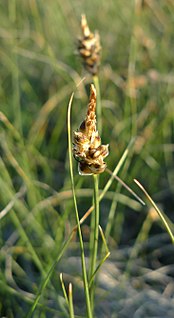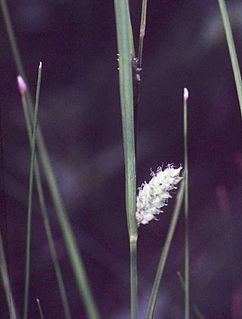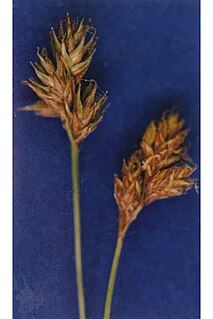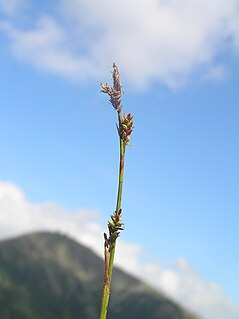Carex amplifolia is a species of sedge known by the common name bigleaf sedge. It is native to western North America from British Columbia to Montana to California, where it grows in wet and seasonally wet areas in coniferous forests.

Carex athrostachya is a species of sedge known by the common name slenderbeak sedge. It is native to western North America, including Alaska to central Canada, the western contiguous United States, and just into Baja California.

Carex comosa is a species of sedge known as longhair sedge and bristly sedge. It is native to North America, where it grows in western and eastern regions of Canada and the United States, and parts of Mexico. It grows in wet places, including meadows and many types of wetlands. Tolerates deeper water than most common species and is good for retention basins. This sedge produces clumps of triangular stems up to 100 or 120 centimeters tall from short rhizomes. The inflorescence is up to 35 centimeters long and has a long bract which is longer than the spikes. It is a cluster of several cylindrical spikes. The scales over the fruits taper into long, thin awns.

Carex diandra is a species of sedge known by the common names lesser tussock-sedge and lesser panicled sedge.

Carex filifolia is a species of sedge known by the common name threadleaf sedge. It is native to western North America and grows on slopes, eroded areas, gravel, and dry habitats.

Carex hassei is a species of sedge known by the common name salt sedge. It is native to western North America from British Columbia to Baja California to New Mexico, where it grows in moist places, such as meadows.

Carex illota is a species of sedge known by the common name sheep sedge. It is native to western North America, where it grows in wet places such as marshes and mountain meadows, from New Mexico and California north to Western Canada.

Carex jonesii is a species of sedge known by the common name Jones' sedge. It is native to the Western United States and grows in moist habitats.

Carex mariposana is a species of sedge known by the common name Mariposa sedge.

Carex nigricans is a species of sedge known by the common name black alpine sedge.

Carex pellita is a species of sedge known by the common name woolly sedge.
Carex petasata is a species of sedge known by the common name Liddon sedge.

Carex phaeocephala is a species of sedge known by the common name dunhead sedge.

Carex raynoldsii is a species of sedge known by the common name Raynolds' sedge. It is native to western North America and grows in alpine to subalpine meadows.

Carex scoparia is a species of sedge known by the common names broom sedge and pointed broom sedge. It should not be confused with the unrelated grass species known as "broom sedge," Andropogon virginicus.
Carex sheldonii is a species of sedge known by the common name Sheldon's sedge.

Carex spissa is a species of sedge known by the common name San Diego sedge. It is native to the southwestern United States in California, Arizona, and New Mexico, and far northern Mexico. It grows in wet places such as seeps and streambanks, sometimes on serpentine soils. This sedge looks somewhat like a cattail. It produces angled stems easily exceeding a meter in height surrounded by leathery green to reddish leaves up to about 1.2 meters long. The inflorescence is up to 80 centimeters long, with many long reddish brown flower spikes, each holding up to 300 developing fruits.

Carex straminiformis is a species of sedge known by the common name Shasta sedge.

Carex concinna is a species of sedge known by the common names low northern sedge, northern elegant sedge, beauty sedge, and beautiful sedge. It is native to northern North America, where it occurs across Canada and in high elevations in the northern contiguous United States.

Carex vaginata is a species of sedge known by the common name sheathed sedge. It has a circumboreal distribution, occurring throughout the northern latitudes of the Northern Hemisphere. It occurs in Alaska, throughout most all of Canada to Greenland and in Eurasia. In North America it occurs as far south as Minnesota and New York.
This page is based on this
Wikipedia article Text is available under the
CC BY-SA 4.0 license; additional terms may apply.
Images, videos and audio are available under their respective licenses.

















